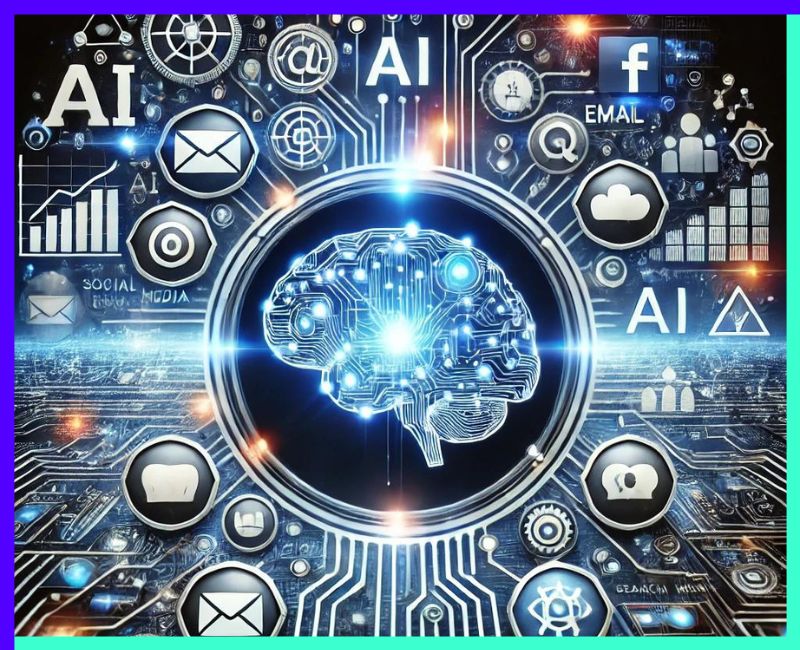In recent years, Artificial Intelligence (AI) has become a cornerstone of digital marketing, revolutionizing how brands interact with their customers and optimize their marketing strategies. From personalized marketing campaigns to predictive analytics, AI’s capabilities are vast and varied. This article explores the transformative impact of AI on digital marketing, detailing its applications, benefits, and future prospects.
Understanding AI in Digital Marketing
AI refers to the simulation of human intelligence in machines that are programmed to think like humans and mimic their actions. In digital marketing, AI is primarily used to automate processes, personalize customer interactions, and analyze large datasets.
AI-driven Personalization
One of the most significant impacts of AI in digital marketing is the ability to personalize at scale. AI algorithms analyze customer data and behavior to tailor marketing messages and offers in real-time. For instance, e-commerce platforms like Amazon use AI to suggest products based on browsing history and previous purchases.
Predictive Analytics
AI enhances predictive analytics by using machine learning models to predict future customer behaviors based on historical data. This ability enables marketers to anticipate needs, forecast trends, and effectively allocate resources.
Chatbots and Customer Service
AI-powered chatbots provide 24/7 customer service, handling inquiries and resolving issues quickly and efficiently. These bots can learn from interactions to improve their responses over time, ensuring an enhanced customer experience.
Content Generation
AI tools also assist in content generation, creating engaging and relevant content based on trending topics and keyword analysis. This not only saves time but also helps in maintaining a consistent voice across various platforms.
Email Marketing Optimization
In email marketing, AI is used to optimize send times, personalize email content, and segment audiences. This results in higher open rates and conversions.
Visual Recognition
AI’s visual recognition capabilities are transforming how brands interact with consumers. Platforms like Pinterest use AI to offer visual search tools that allow users to search for products by uploading images.
Voice Search Optimization
With the rise of virtual assistants like Alexa and Google Assistant, optimizing for voice search has become crucial. AI helps in understanding natural language to ensure brands appear in voice searches.
Challenges and Considerations
While AI offers numerous advantages, it also poses challenges such as data privacy concerns and the need for high-quality data to train AI models. Marketers must navigate these challenges carefully to fully leverage AI technologies.
The Future of AI in Digital Marketing
Looking ahead, AI is expected to become even more sophisticated, with advancements in natural language processing and machine learning further enhancing personalized marketing and customer engagement.
Future AI marketing tools
The future of AI marketing tools is poised to further transform how businesses engage with their audiences through even more personalized, efficient, and intelligent technologies. Here are several promising AI marketing tools and technologies that are expected to evolve and become more prevalent in the near future:
- Advanced Predictive Analytics – Tools that utilize AI to predict consumer behavior with greater accuracy, allowing marketers to target potential customers more effectively based on their predicted future actions.
- Enhanced Personalization Engines – These tools will go beyond basic product recommendations to personalize every aspect of the marketing funnel, delivering highly tailored content, product suggestions, and interactions based on real-time data.
- Autonomous Content Creation – AI tools that can generate not just data-driven content but also creative material, such as videos, graphics, and interactive media, tailored to user preferences and behaviors.
- Voice and Visual Search Optimization – With the increasing use of voice-activated assistants and visual search, AI tools will focus on optimizing content for these platforms, ensuring brands remain prominently visible in a new era of search technology.
- Emotion AI – Technologies that can detect customer emotions through text, voice, or facial recognition to adjust marketing messages dynamically, enhancing customer experience and engagement.
- AI-Driven Real-Time Bidding – Improved AI algorithms for programmatic advertising that can make more precise bidding decisions in real time to optimize advertising spend and targeting.
- Blockchain for Transparency and Security – Integration of AI with blockchain technology to enhance transparency and security in marketing practices, particularly in handling customer data and ensuring privacy.
- Chatbots with Advanced Capabilities – Next-generation chatbots that offer more nuanced interactions, capable of handling complex customer service tasks and providing personalized shopping assistance.
- Internet of Things (IoT) Marketing Applications – AI tools that analyze data from IoT devices to offer real-time marketing personalizations and interventions based on user activity and environmental factors.
- Neuro-Marketing Tools – Devices and software that use neuroscience to analyze brain responses to marketing stimuli, providing deeper insights into consumer decisions and helping tailor marketing strategies accordingly.
These tools represent the forefront of marketing technology, leveraging AI’s potential to analyze vast amounts of data, predict trends, and personalize interactions to an unprecedented degree. As these technologies mature, they will undoubtedly open up new avenues for creativity and efficiency in digital marketing.
AI is not just a tool; it is a transformative force in digital marketing, offering unprecedented opportunities for innovation and efficiency. As technology continues to evolve, so too will the ways in which marketers can utilize AI to connect with customers and drive business success.
